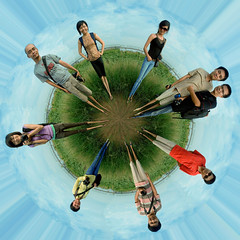
Tony Burgess, one of the founders of the CommpanyCommand community (and author) made a great post on Com-Prac this week around engagement in communities of practice. It was so terrific, I want to point to it and share a snippet from his post.
com-prac : Message: Re: [cp] CoPs and unpaid volunteers
The question I have asked myself is, “What is the experience of becoming an
especially active member of a community of practice?” In the process of
searching out this question, what emerged for me was a sense for what makes
members’ experience meaningful. It is the depth of meaning that they make from
the experience of being an active member that seems to propel them forward in
their journey. In a nutshell, here are three factors that stood out to me:The experience is meaningful to me (an active member) along three dimensions:
(1) Connection: As a result of this experience I am becoming connected to
like-hearted leaders who I value. This is about relationship.(2) Contribution: I am able to give back and make a difference–to contribute
my unique experience and talent to something greater than self. I am making a
positive difference for people and a collective that I value.(3) Personal Development: As a result of this experience, I am personally
developing and becoming more effective as a leader and a person than I would
otherwise be. I am being exposed to people and experiences that change me. I’m
learning.Given this understanding, a follow-up question follows:? “What can we as a
community of practice do to be a catalyst for the meaningful experience of
members?”
These three dimensions are terrific. They are also pretty general. A good starting place, but I think in practice, we need to go deeper. How do we understand these motivations? Both in CoPs and in other collaborative settings.
In yesterday’s telecons in our Knowledge Sharing Workshop, we asked what people thought motivated others to share knowledge. We talked about “gaining visibility for work” and “getting useful information.” They were all “true” answers, but very general. Easy to say yes to on first blush, but often prioritized at the bottom of giant to-do lists and thus engagement rarely happens.
Then we asked them personally, what motivated them to share their knowledge in the workshop and the answers were much more specific and actionable. People had a task they needed to do involving knowledge sharing. They wanted to expand their network of colleagues working in KS because they didn’t have enough of those people in their daily work life. And yes, some of them wanted to share because they believed in sharing. Those seem to be the people we can count on, but make up a fairly small percentage of any group we are working with.
When we are trying to design, support, create conditions for collaboration, how do we best suss out motivation to increase the chance of actual engagement? What are your “sussing” strategies?
Photo Credit:
 Last week I wrote about
Last week I wrote about 
 Pete Shelton (IFPRI of the CGIAR along with his co-blogger, Stephan Dorn) has a must read post for anyone trying to introduce “web 2” tools to their work communities. He speaks of researchers here (in international agricultural research) but I believe they apply in many other settings as well. Read the whole thing…
Pete Shelton (IFPRI of the CGIAR along with his co-blogger, Stephan Dorn) has a must read post for anyone trying to introduce “web 2” tools to their work communities. He speaks of researchers here (in international agricultural research) but I believe they apply in many other settings as well. Read the whole thing…